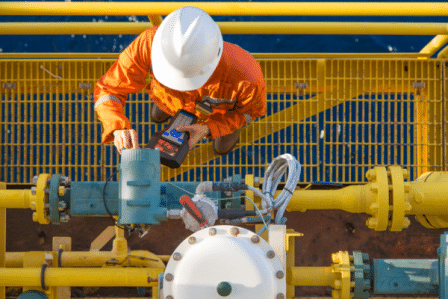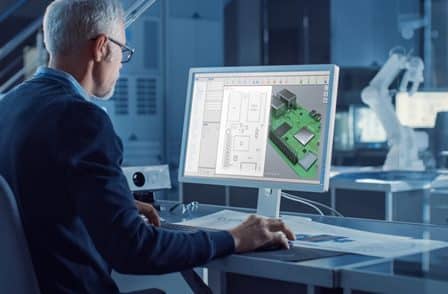Course Overview
The Online Master of Engineering Electrical Instrumentation in Oil and Gas is a comprehensive qualification for Design, Installation, Commissioning and Maintenance Engineers who are looking for a career in the onshore and offshore oil and gas industry. Upon completion of this program, you will gain skills and knowledge in the latest and developing technologies in electrical and instrumentation in oil and gas.
This course is no longer accredited. You may want to learn more about.
Master of Engineering Electrical Instrumentation Program Details
This program addresses the specific core competencies and associated underpinning knowledge required for the position of Principal Engineer.
The units in this degree cover electrical & instrumentation (E&I) engineering, its design, and the management of E&I personnel. Other topics include; process control, process safety lifecycle management, the safety integrity of facilities, power engineering, maintenance management, and specialist areas such as emergency shutdown systems, fire, and gas. The program is rounded off with a unit on project management.
The master’s project thesis, as the capstone of the program, requires a high level of personal autonomy and purpose; it reinforces the knowledge gained during the degree. As a significant research component of the program, this project requires students to examine and explore their subjects, make critical evaluations, and apply their knowledge and skill. It aims to prepare and enable students to critique and potentially enhance current professional practice in the oil and gas industry.
You must complete 48 credit points comprising twelve core units and one capstone thesis. There are no electives in this program. The program duration is two years, and we deliver units over four terms per year, so you will take two units per term. There will be a short break between years.
Year One
| Term | Unit Code | Subjects | Credit Points |
| Term 1 | MOG501 | Introduction to Oil and Gas | 3 |
| Term 1 | MOG502 | Instrument Engineering | 3 |
| Term 2 | MOG503 | Process Control Systems | 3 |
| Term 2 | MOG504 | Power Engineering Practice | 3 |
| Term 3 | MOG505 | E&I Design | 3 |
| Term 3 | MOG506 | Process Safety Lifecycle Management | 3 |
| Term 4 | MOG507 | Emergency Shutdown Systems | 3 |
| Term 4 | MOG508 | Fire and Gas Systems | 3 |
Year Two
| Term | Unit Code | Subjects | Credit Points |
| Term 1 | MOG603 | Reliability & Maintenance Management | 3 |
| Term 1 | MXX507 | Professional Engineering Management | |
| Term 2 | MXX501/601 | Engineering Practice and Key Research Methods | 3 |
| Term 2 | MOG604 | Power Management Systems | 3 |
| Terms 3 & 4 | ME700 | Project Thesis (taken over two terms) | 12 |
Additional Mandatory Units
| Semester | Unit Code | Subjects | Credit Points |
| N/A | BXX001* | Hands-on Workshop 1 | 0 |
| N/A | BXX002* | Hands-on Workshop 2 | 0 |
| N/A | BXX003* | Hands-on Workshop 3 | 0 |
| N/A | BXX004* | Hands-on Workshop 4 | 0 |
| N/A | MXX001 | Professional Practice Hands-on Workshop | 0 |
| N/A | MXX510 | Professional Experience | 0 |
*Applicable to students gaining entry under option 1) or 4) of the Entry Requirements.
Graduate Diploma of Engineering (Electrical and Instrumentation in Oil and Gas)
Students who elect to exit the program after successfully completing all of the first-year units, as outlined above, can opt to receive EIT’s Graduate Diploma of Engineering (Electrical and Instrumentation in Oil and Gas). If students wish to finalize the Master qualification after exiting at the Graduate Diploma level, they will need to re-enroll and relinquish the Graduate Diploma testamur.
Rules of Progression
You can only attempt the Project Thesis once you have successfully completed all other units. All engineering disciplines are built up of individual bodies-of-knowledge that together target a specific application. It not only relies on the combined body of knowledge from the undergraduate degree, specifically mathematics, physics, and discipline knowledge, but also on the various units that form this program.
The ‘500’ level units are designed at the Australian Qualifications Framework level eight (Graduate Diploma). The knowledge from each unit allows you to be able to investigate challenging problems, analyse and synthesize complex solutions, and communicate your solutions and ideas.
This will enable successful progress to the ‘600’ level units at the Australian Qualifications Framework level nine (master’s degree). All this knowledge is brought together as you tackle complex application problems in your final thesis.
The content of each unit is designed to provide a graduated increase in knowledge and skills from the ‘500’ level units to the ‘600’ level units culminating in a Project Thesis. All units must be passed, or have exemptions, to achieve the qualification.
The Graduate Diploma of Engineering is nested within the master’s degree as an exit point only after the successful completion of all the ‘500’ level units of the program. Both qualifications have the same entry requirements. The second year of the master’s degree does not serve as an entry point.
Work-Integrated Learning
EIT’s Master of Engineering programs require students to undertake 240 hours of paid or unpaid professional work-integrated learning. This can incorporate paid or unpaid internships, site visits, contributing to industry projects, and networking activities.
In undertaking an internship, students will interact with employees and become exposed to organizational policy and culture. You will familiarise yourself with organizational communication procedures, a variety of engineering disciplines, and obtain insight and practical aptitude in projects from the planning phase to completion.
If you already have some work experience in the relevant engineering field, you may apply to have credit granted by completing the associated recognition of prior learning form.
To gain entry into this program, we require applicants to hold:
- A recognized 3-year bachelor degree* in an engineering qualification in a congruent** field of practice; OR
- An EIT Bachelor of Science (Engineering) degree* in a congruent** field of practice; OR
- A 4-year Bachelor of Engineering qualification (or equivalent) that is recognized under the Washington Accord or by Engineers Australia, in a congruent**, or a different field of practice at the discretion of the Admissions Committee; OR
- A 4-year Bachelor of Engineering qualification (or equivalent)* that is not recognized under the Washington Accord, in a congruent** field of practice to this program; AND
- An appropriate level of English Language Proficiency equivalent to an English pass level in an Australian Senior Certificate of Education, or an IELTS score of 6.0 (with no individual band less than 6.0), or equivalent as outlined in the EIT Admissions Policy.
* With integrated compulsory twelve-week professional industry experience, training or project work of which six weeks are directly supervised by a professional/eligible professional engineer as determined by EIT.
** Congruent field of practice means one of the following with adequate Industrial Automation content (fields not listed below to be considered by the Dean and the Admissions Committee on a case-by-case basis):
- Electronic and Communication Systems
- Instrumentation, Control, and Automation
- Industrial Automation
- Industrial Engineering
- Electrical Engineering
- Chemical Engineering
- Process Engineering
- Mechatronic Systems
- Production Engineering
- Robotics
Please note: meeting the minimum admission criteria does not guarantee entry to our programs. Applications are assessed on a case-by-case basis.
Please check the Documentation Guidelines for your application.
Graduates of this program may find roles as:
- Project Engineer
- Senior Production Engineer
- Oil & Gas Engineer
- Reservoir Engineer










